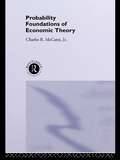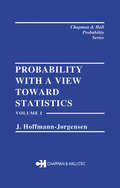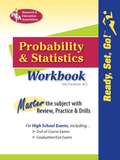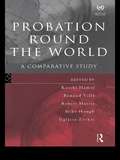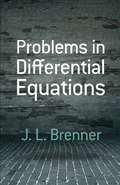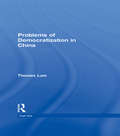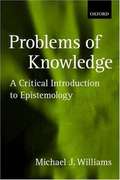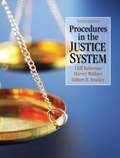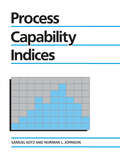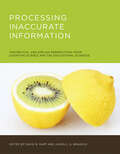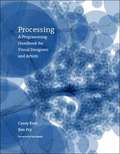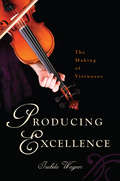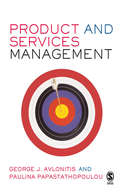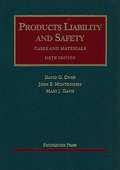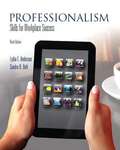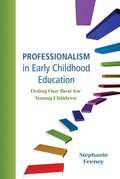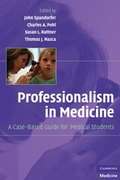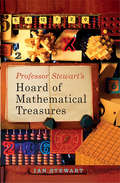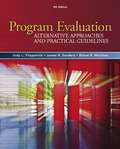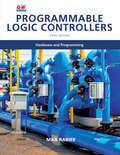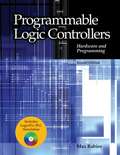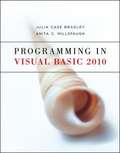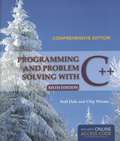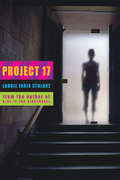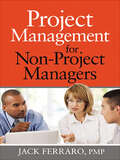- Table View
- List View
Probability Foundations of Economic Theory
by Charles McCannFirst published in 1994. Routledge is an imprint of Taylor & Francis, an informa company.
Probability With a View Towards Statistics, Volume I (Chapman And Hall/crc Probability Ser.)
by J. Hoffman-JorgensenVolume I of this two-volume text and reference work begins by providing a foundation in measure and integration theory. It then offers a systematic introduction to probability theory, and in particular, those parts that are used in statistics. This volume discusses the law of large numbers for independent and non-independent random variables, transforms, special distributions, convergence in law, the central limit theorem for normal and infinitely divisible laws, conditional expectations and martingales. Unusual topics include the uniqueness and convergence theorem for general transforms with characteristic functions, Laplace transforms, moment transforms and generating functions as special examples. The text contains substantive applications, e.g., epidemic models, the ballot problem, stock market models and water reservoir models, and discussion of the historical background. The exercise sets contain a variety of problems ranging from simple exercises to extensions of the theory.
Probability and Statistics Workbook (Mathematics Learning And Practice Ser.)
by Mel FriedmanProbability and Statistics Workbook an Easy-to-Use Workbook Series for Students Struggling with Math A Perfect Study Tool for Exit Exams, End-of-Course Exams, or Graduation Exams. Many students continue to struggle in high school math courses because they failed to master the basic mathematical skills. REA's Ready, Set, Go! Workbook series takes the confusion out of math, helping students raise their grades and score higher on important exams. What makes REA's workbooks different? Students will actually like using them. Here's why: * Math is explained in simple language, in an easy-to-follow style * The workbooks allow students to learn at their own pace and master the subject * Each lesson is devoted to a key math concept and includes step-by-step examples * Paced instruction with drills and quizzes reinforce learning * Every answer to every question, in every test, is explained in full detail * A final exam lets students test what they've learned. When students apply the skills they've mastered in our workbooks, they can do better in class, raise their grades, and score higher on the all-important end-of-course, graduation, and exit exams Whether used in a classroom, for home or self-study, or with a tutor, this workbook gets students ready for important math tests and exams, set to take on new challenges, and helps them go forward in their studies!
Probation Round the World
by Robert Harris Mike Hough Koichi Hamai Renaud Villé Ugljesa ZvekicWhilst they retain a recognisable common core, probation systems round the world are enormously varied, and many are in a state of rapid change. Probation Round the World is a study of probation in ten countries, ranging from the well-resourced and heavily professionalised services of Britain and the old Commonwealth to the reliance on lay-supervisors in Japan and the community-based system which has recently been set up in Papua new Guinea. Probation Round the World resulted from collaborative research conducted by the United Nations Interregional Crime and Justice Research Institute (UNICRI) and the British Home Office. The first part of the book comprises a review of the development and convergence of probation within the Civil Law and Common Law traditions. The second part describes the origins and functions of systems in the ten countries, drawing out salient differences and similarities. It will provide invaluable reading for students of criminal justice and criminology and for professionals working in probation managment and government.
Problems in Differential Equations (Dover Books on Mathematics)
by J. L. BrennerA supplement for elementary and intermediate courses in differential equations, this text features more than 900 problems and answers. Suitable for undergraduate students of mathematics, engineering, and physics, this volume also represents a helpful tool for professionals wishing to brush up on their problem-solving skills.The book is divided into twenty sections, each preceded by a clear and logical explanation of the basic ideas needed for solving the problems within the section. Many fully explained illustrative problems appear throughout the text. Subjects include applied routine and nonroutine problems in vibrations, electrical engineering, mechanics, and physics. Stars indicate advanced problems. Short mathematical and numerical tables are provided at the end of the book.
Problems of Democratization in China (East Asia)
by Thomas G. LumFirst published in 2000. Routledge is an imprint of Taylor & Francis, an informa company.
Problems of Knowledge: A Critical Introduction to Epistemology
by Michael WilliamsProblems of Knowledge provides clear and engaging explanations of the theory of knowledge and why it matters, offering an excellent foundation for students in introductory epistemology courses.
Procedures in the Justice System (10th Edition)
by Cliff Roberson Harvey WallaceProcedures in the Justice System, 10e, is comprehensive yet readable. Designed for one-semester courses on American criminal courts, it covers the court systems and processes using a sequential approach-following law violators from arrest to conviction and sentencing. Each chapter examines the roles that law enforcement agencies, courts, and correctional departments play in the process, and builds logically on previous material. Down-to-earth examples, illustrations, court documents, and cases help make procedures more real and concrete.
Process Capability Indices: A Comprehensive Exposition Of Quality Control Measures (Series On Quality, Reliability And Engineering Statistics #Vol. 12)
by Samuel Kotz Norman L. JohnsonA solid, rigorous, yet comprehensible analysis of process capability indices, this work bridges the gap between theoretical statisticians and quality control practitioners, showing how an understanding of these indices can lead to process improvement.
Processing Inaccurate Information: Theoretical and Applied Perspectives from Cognitive Science and the Educational Sciences (The\mit Press Ser.)
by Jason L.G. Braasch David N. RappInterdisciplinary approaches to identifying, understanding, and remediating people's reliance on inaccurate information that they should know to be wrong.Our lives revolve around the acquisition of information. Sometimes the information we acquire—from other people, from books, or from the media—is wrong. Studies show that people rely on such misinformation, sometimes even when they are aware that the information is inaccurate or invalid. And yet investigations of learning and knowledge acquisition largely ignore encounters with this sort of problematic material. This volume fills the gap, offering theoretical and empirical perspectives on the processing of misinformation and its consequences.The contributors, from cognitive science and education science, provide analyses that represent a variety of methodologies, theoretical orientations, and fields of expertise. The chapters describe the behavioral consequences of relying on misinformation and outline possible remediations; discuss the cognitive activities that underlie encounters with inaccuracies, investigating why reliance occurs so readily; present theoretical and philosophical considerations of the nature of inaccuracies; and offer formal, empirically driven frameworks that detail when and how inaccuracies will lead to comprehension difficulties.ContributorsPeter Afflerbach, Patricia A. Alexander, Jessica J. Andrews, Peter Baggetta, Jason L. G. Braasch, Ivar Bråten, M. Anne Britt, Rainer Bromme, Luke A. Buckland, Clark A. Chinn, Byeong-Young Cho, Sidney K. D'Mello, Andrea A. diSessa, Ullrich K. H. Ecker, Arthur C. Graesser, Douglas J. Hacker, Brenda Hannon, Xiangen Hu, Maj-Britt Isberner, Koto Ishiwa, Matthew E. Jacovina, Panayiota Kendeou, Jong-Yun Kim, Stephan Lewandowsky, Elizabeth J. Marsh, Ruth Mayo, Keith K. Millis, Edward J. O'Brien, Herre van Oostendorp, José Otero, David N. Rapp, Tobias Richter, Ronald W. Rinehart, Yaacov Schul, Colleen M. Seifert, Marc Stadtler, Brent Steffens, Helge I. Strømsø, Briony Swire, Sharda Umanath
Processing: A Programming Handbook for Visual Designers and Artists
by Ben Fry John Maeda Casey ReasAn introduction to the ideas of computer programming within the context of the visual arts that also serves as a reference and text for Processing, an open-source programming language designed for creating images, animation, and interactivity.
Producing Excellence
by Izabela WagnerDriven by a passion for music, for excellence, and for fame, violin soloists are immersed from early childhood in high-pressure competitions, regular public appearances, and arduous daily practice. An in-depth study of nearly one hundred such children, Producing Excellence illuminates the process these young violinists undergo to become elite international soloists. A musician and a parent of a young violinist, sociologist Izabela Wagner offers an inside look at how her young subjects set out on the long road to becoming a soloist. The remarkable research she conducted--at rehearsals, lessons, and in other educational settings--enabled her to gain deep insight into what distinguishes these talented prodigies and their training. She notes, for instance, the importance of a family culture steeped in the values of the musical world. Indeed, more than half of these students come from a family of professional musicians and were raised in an atmosphere marked by the importance of instrumental practice, the vitality of music as a vocation, and especially the veneration of famous artists. Wagner also highlights the highly structured, rigorous training system of identifying, nurturing, and rewarding talent, even as she underscores the social, economic, and cultural factors that make success in this system possible. Offering an intimate portrait of the students, their parents, and their instructors, Producing Excellence sheds new light on the development of exceptional musical talent, as well as draw much larger conclusions as to "producing prodigy" in other competition-prone areas, such as sports, sciences, the professions, and other arts. Wagner's insights make this book valuable for academics interested in the study of occupations, and her clear, lively writing is perfect for general readers curious about the ins and outs of training to be a violin soloist.
Product and Services Management
by Paulina Papastathopoulou George J. Avlonitis`A text that successfully bridges the gap between academic theorizing and practitioner applicability because it uses multiple real-world examples/mini-cases of management techniques to illustrate the well-researched academic theoretical foundations of the book' - Creativity and Innovation Management `A complete and useful treatment of the domain of product and service decisions. This book is unique in its treatment, dealing with product and service portfolio evaluation, new product/service development and product/service elimination in an integrated manner. Enlivened by many mini-cases, the book provides a soup-to-nuts approach that will prove very attractive for students and be a valuable reference for managers as well. Highly recommended' - Gary L Lilien, Distinguished Research Professor of Management Science, Penn State University `Product and Services Management (PSM) is a welcome, up to date summary of the key issues facing firms in developing and refreshing their portfolios. The examples and cases bring the academic arguments clearly into focus and demonstrate the crucial role of PSM in leading the overall strategy of the firm' - Professor Graham Hooley, Senior Pro-Vice-Chancellor, Aston University, Birmingham `Managers responsible for and students interested in product portfolio decisions previously had to consult several sources for obtaining up-to-date information; books on new product development, articles on service development, readers on product management, and frameworks for product evaluation and termination. With the book Product and Services Management the reader obtains four-in-one. Avlonitis and Papastathopoulou reveal in a compelling and comprehensive manner why product decisions are the cornerstone of modern marketing and business, and illustrate the theory with numerous mini-cases from Europe and elsewhere. A must read for everyone with a passion for products' - Dr Erik Jan Hultink, Professor of New Product Marketing, Delft University of Technology This book provides a holistic approach to the study of product and services management. It looks at the key milestones within a product's or service life cycle and considers in detail three crucial areas within product management, namely product/service portfolio evaluation, new product/service development and product/service elimination. Based on research conducted in Europe and North America, this book includes revealing cases studies that will help students make important connections between theory and practice. The pedagogical features provided in each chapter include chapter introduction, summary, questions and a further reading section. Additional material for instructors include PowerPoint slides and indicative answers to each chapter's questions. This book is written for undergraduate and postgraduate students of business administration who are pursuing courses in marketing, product portfolio management, new product development and product policy.
Products Liability and Safety: Cases and Materials (Sixth Edition)
by Mary Davis David Owen John MontgomeryThe new edition of this classic casebook continues its long tradition of sensitively exploring products liability law and theory. The Sixth Edition includes significant new materials on such topics as design defects, warning defects, special issues on causation, federal preemption (including Wyeth v. Levine on pharmaceutical preemption), toxic substances (including important new material on medical monitoring), and punitive damages (including Philip Morris v. Williams). Daubert issues and the Products Liability Restatement are integrated throughout. Previous editions of this classic casebook have been adopted at over 100 law schools such as Harvard, Yale, Penn, NYU, Michigan, Duke, Georgetown, and Texas
Professionalism Skills for Workplace Success (Third Edition)
by Lydia E. Anderson Sandra B. BoltThe book designed as a workbook that can be kept and referred to throughout one's career addresses employer concerns by providing those new to the workplace with basic skills for success on the job and providing job seekers the tools they need to secure the job of their dreams. This unique text prepares students for their first professional workplace experience by linking self-management issues to career planning tools and workplace basics, including expected behaviors.
Professionalism in Early Childhood Education: Doing Our Best for Young Children
by Stephanie FeeneyFeeney (education, U. of Hawaii at Manoa) discusses the implications of professionalism for early childhood education, for education students and in-service trainees. She examines how professions are organized, including an overview of the nature of professions and the professional status of early childhood education; how individuals can exhibit the ideals and principles of professions in their work with children and families, including the knowledge and skills of early childhood educators, professional behavior, including communication and relationship skills, work ethic, professional ethics, and personal qualities; and self-reflection. Annotation ©2012 Book News, Inc. , Portland, OR (booknews. com)
Professionalism in Medicine: A Case-based Guide for Medical Students
by John Spandorfer Charles A. Pohl Susan L. Rattner Thomas J. NascaLearning medical professionalism is a challenging, evolving, and life-long endeavor. Professionalism in Medicine: A Case-Based Guide for Medical Students helps begin this process by engaging students and their teachers in reflection on cases that resonate with the experiences of life in medicine. Through the book's seventy-two cases, commentaries, videos, and literature-based reviews, students explore the many challenging areas of medical professionalism. Readers will appreciate the provocative professionalism dilemmas encountered by students from the pre-clinical years and clinical rotations and by physicians of various specialties. Each case is followed by two commentaries by writers who are involved in health care decisions related to that case, and who represent a wide variety of perspectives. Authors represent 46 medical schools and other institutions and include physicians, medical students, medical ethicists, lawyers, psychologists, nurses, social workers, pharmacists, health care administrators, and patient advocates.
Professor Stewart's Hoard of Mathematical Treasures
by Ian StewartOpening another drawer in his Cabinet of Curiosities, renowned mathematics professor Ian Stewart presents a new medley of games, paradoxes, and riddles in Professor Stewart’s Hoard of Mathematical Treasures. With wit and aplomb, Stewart mingles casual puzzles with grander forays into ancient and modern mathematical thought. Amongst a host of arcane and astonishing facts about every kind of number from irrational and imaginary to complex and cuneiform, we learn: - How to organize chaos - How matter balances anti-matter - How to turn a sphere inside out (without creasing it) - How to calculate pi by observing the stars - . . . and why you can’t comb a hairy ball. Along the way Stewart offers the reader tantalizing glimpses of the mathematics underlying life and the universe. Mind-stretching, enlightening, and endlessly amusing, Professor Stewart’s Hoard of Mathematical Treasures will stimulate, delight, and enthrall.
Program Evaluation: Alternative Approaches and Practical Guidelines
by Jody L. Fitzpatrick James R. Sanders Blaine R. WorthenThis textbook by Fitzpatrick (U. of Colorado Denver), Sanders (Western Michigan U.), and Worthen (Utah State U.) provides information on conducting evaluations of organizational programs. The authors have organized the material into four sections introducing the key concepts of evaluation, describing major models and theories of evaluation approaches, discussing the processes of planning evaluations, and reviewing the various methodological issues of conducting evaluations. For this new edition, the material has been updated in light of the most current approaches and theories of evaluation; a new chapter has been included on the role of politics in evaluation and ethical considerations; increased attention has been paid to mixed methods in design, data collection, and analysis; and new sections have been included on organizational learning, evaluation capacity building, mainstreaming evaluation, and cultural competence, among other changes. Annotation ©2011 Book News, Inc., Portland, OR (booknews.com)
Programmable Logic Controllers: Hardware And Programming
by Max RabieeProgrammable Logic Controllers: Hardware and Programming provides a comprehensive introduction to PLCs and their applications in process and industrial control systems. Based on RSLogix 500 programming software and the Allen-Bradley SLC 500 controller, this text uses a practical applied approach to master comprehension by beginning with concepts such as basic hardware and programming before progressing to system-level applications. PLC maintenance, testing, and troubleshooting are also covered. Clear illustrations and examples are provided in the text to help explain system functions and complex concepts.
Programmable Logic Controllers: Hardware and Programming (Second Edition)
by Max RabieeThe key concepts of PLCs are discussed using a comprehensive approach to enhance learning.
Programming In Visual Basic 2010
by Julia Case Bradley Anita MillspaughThe author team of Julia Bradley and Anita Millspaugh remain the guiding light for countless students around the world in Programming with Visual Basic 2010. How better to master the most popular object-oriented programming language than to use the bestselling textbook? Be at the cutting edge of technology with examples, feedback questions, and a full Hands On Programming Example. Apply the concepts yourself with Case Studies and Exercises. Screen captures, step-by-step exercises, and thorough appendices ensure that Programming Excellence Begins Here.
Project 17
by Laurie Faria StolarzHigh atop Hathorne Hill, near Boston, sits Danvers State Hospital. Built in 1878 and closed in 1992, this abandoned mental institution is rumored to be the birthplace of the lobotomy. Locals have long believed the place to be haunted. They tell stories about the unmarked graves in the back, of the cold spots felt throughout the underground tunnels, and of the treasures found inside: patients' personal items like journals, hair combs, and bars of soap, or even their old medical records, left behind by the state for trespassers to view. On the eve of the hospital's demolition, six teens break in to spend the night and film a movie about their adventures. For Derik, it's an opportunity to win a filmmaking contest and save himself from a future of flipping burgers at his parents' diner. For the others, it's a chance to be on TV, or a night with no parents. But what starts as a playful dare quickly escalates into a frenzy of nightmarish action. Behind the crumbling walls, down every dark passageway, and in each deserted room, they will unravel the mysteries of those who once lived there and the spirits who still might.
Project Management for Non-Project Managers
by Jack FerraroThis practical guide reveals the project management methodology and processes that will give you the advantage to ensure your projects&’ success--and advance organizational goals.As a seasoned project management consultant and instructor for the American Management Association, author Jack Ferraro has gained years of experience bridging the gap between project managers and functional managers to help countless teams improve their performance. In this book, he demystifies the jargon and processes of project management, encouraging functional managers to jump into the PM arena and arming them with step-by-step guidelines for mastering the most critical PM skills.In Project Management for Non-Project Managers, you will discover:business analysis techniques,work breakdown structures,program sequencing techniques,and risk management methods. Great managers are experts at getting bottom-line results, but often do not understand their role in the success or failure of their organization's projects. As projects become more strategic and collaborative, managers with even basic project-management knowledge are most capable of keeping projects business-focused.By switching gears from passive bystander to active owner of project strategies, you&’ll keep your team&’s projects on track and, as a result, increase their business value.
